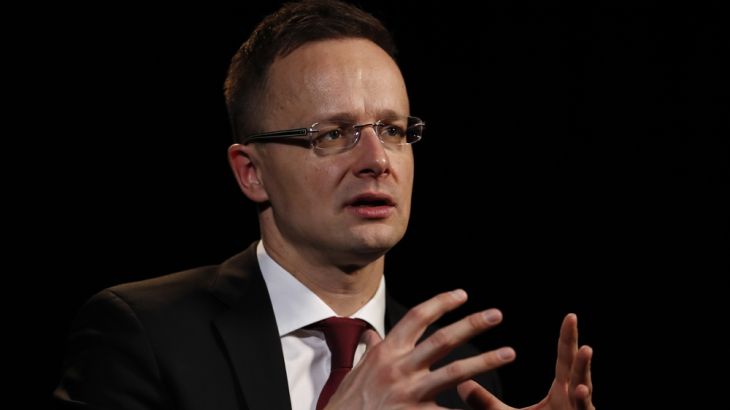
Peter Szijjarto: Why we fight the EU on refugees
Hungary’s foreign minister discusses tough immigration policies and the fight against EU migrant quotas.
Since the start of Europe’s migrant crisis, Hungary has regularly been criticised over its controversial and tough immigration policies.
In September, the European Court of Justice (ECJ) rejected complaints filed by Slovakia and Hungary against a mandatory quota to accept asylum seekers, established as part of efforts to resettle arriving refugees more equally across the EU.
The court’s decision is final and not open to appeal. As a result, European officials will continue to be able to order member state governments to take in specific quotas of refugees entering the bloc.
The security situation has never been that bad in Europe than currently in modern history and the threat of terror has never been that serious as it is currently, and this is a direct consequence of the fact that 1.5 illegal migrants were allowed to come to Europe without any kind of control, regulation or check...
Budapest condemned the court ruling as “appalling and irresponsible”, saying the EU will pay for its security fence with Serbia. Hungary’s foreign minister, Peter Szijjarto, reportedly said: “This decision jeopardises the security and future of all of Europe. Politics has raped European law and values.”
So is Hungary willing to play by the EU’s rules? And with increasing criticism of the country’s immigration policies and concerning freedom of speech, does Hungary really share the EU’s values?
“I think [the criticism] it’s extremely unfair because there’s an issue where we don’t agree – definitely. We think illegal migration is a security threat to Europe. Others say that illegal migration is acceptable. We don’t think it’s acceptable. But that should not give the reason to anyone to question whether Hungary respects European values or not because we have been members of the European Union … We share the European regulations, and we share the European values, of course,” Peter Szijjarto, Hungary’s foreign minister, tells Al Jazeera.
Responding to criticism that his country isn’t living up to its treaty obligations of accepting more refugees, Szijjarto tells Al Jazeera:
“Hungary has always fulfilled all the obligations we have on an international level. When the migrants came to Hungary, we have offered them the supply and treatment which is written in the international contracts and regulations. But those people were not ready to go to refugee camps, those people occupied public areas, those people blocked the highways, those people occupied the railway stations … They refused to cooperate with the local authorities, they refused to go to the refugee camps, and they have violated very important European regulations …”
Hungary’s foreign minister calls illegal migration a “bad phenomenon” and believes the migrant issue is to blame for the security threat facing Europe.
“The security situation has never been that bad in Europe than currently in modern history and the threat of terror has never been that serious as it is currently, and this is a direct consequence of the fact that 1.5 illegal migrants were allowed to come to Europe without any kind of control, regulation or check. And with this, I don’t say that those 1.5 million are terrorists – of course, I don’t say that – but I say such a big, illegal massive influx of people gave the opportunity for terrorist organisations to send their fighters, their terrorists to come to Europe.”
“Our position is that we should not encourage more people to take the life hazard, life risk to come to Europe, but we should help them to stay as close to their homes as possible. That’s why our initiative has always been to give more financial aid to Turkey, Jordan, Lebanon, the Kurdish region of Iraq because these entities have been taking care of many refugees,” Szijjarto says.
Despite disagreements and controversy, Szijjarto says Hungary is committed to staying in the EU: “We have been members of the European Union and we will be members of the European Union – that’s not a question, no one raises this question.”